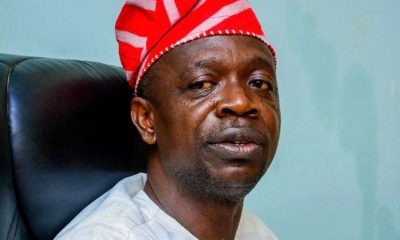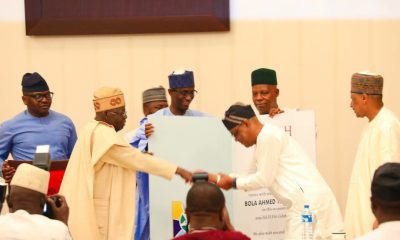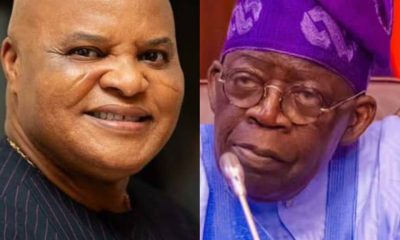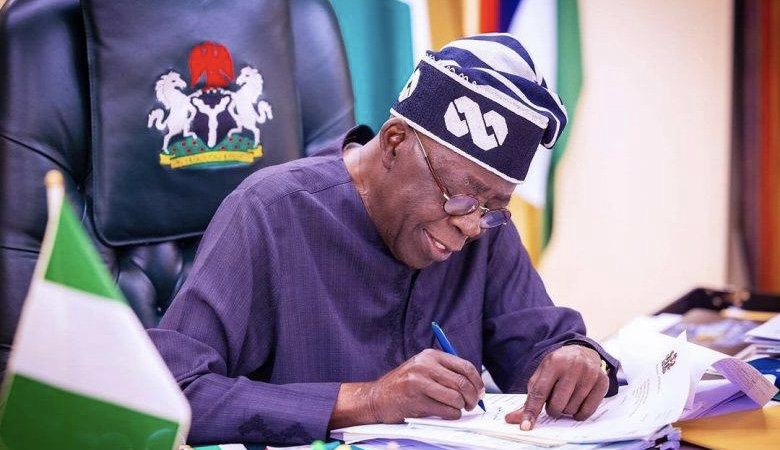Politics
Impasse: President Tinubu’s hands tied over Kano, Rivers crises
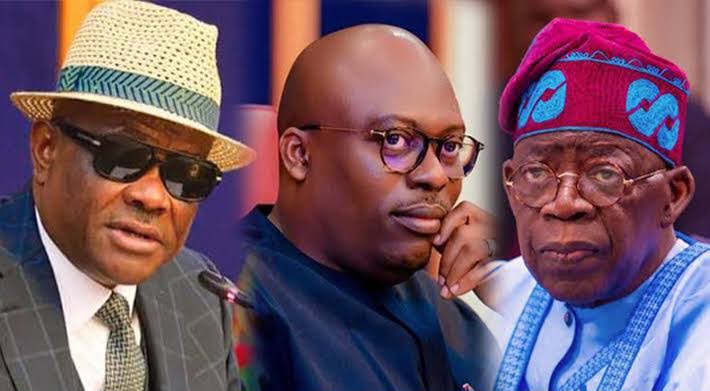
Nigeria’s President, Bola Tinubu, has largely stayed out of the picture while Kano and Rivers, two opposition states that could well decide his fate in 2027, continue to be embroiled in seemingly intractable political crisis. But, while some observers have questioned the rationale behind the president’s seeming unwillingness to intervene, Business Hallmark gathered from reliable sources in the seat of power that he was promptly advised to thread carefully.
“No, he won’t intervene, at least not openly or in a way that would portray him as taking sides, because that could make matters worse,” said a source at the presidency, who craved anonymity. “Effort is ongoing to resolve the issues in both states and hopefully, they will be resolved soon.”
Kano and Rivers are two of Nigeria’s most volatile states with potential to bring down the central government. The former with its large population and political sophistication is both the commercial nerve centre of northern Nigeria as well as its most tensile religious city. A crisis in Kano – which now lurks behind the emirship tussle that has pitted Muhammadu Sanusi II and Aminu Ado Bayero, the two fronts in what beyond the surface is a supremacy battle between two past governors of the state, Rabiu Musa Kwankwaso, leader of the Kwankwasiyya Movement, and Abdullahi Ganduje, chairman of the All Progressives Congress (APC) – has the potential to destabilise a country already facing intractable security challenges.
Kwankwaso had, as governor, appointed Sanusi as the 14th Emir of Kano on June 8, 2014, after the death of Ado Bayero, following his removal as governor of the Central Bank of Nigeria (CBN) by the administration of Goodluck Jonathan, with whom he had frosty relationship.
While many had expected Bayero’s son, Aminu to succeed him, Kwankwaso opted for Sanusi, a move many reasoned was aimed at shielding him from possible prosecution by the Jonathan administration.
In 2015, however, Kwankwaso’s deputy, Ganduje succeeded him as governor, and in no time both men fell bitterly apart, and Sanusi being an ally of Kwankwaso, became a target. In 2019, the Kano Assembly amended the state emirate law, creating four additional emirates, and ultimately, on 9 March 2020, the Ganduje government dethroned and exiled him, and Aminu Ado Bayero, son of the late emir took the throne as the 15th Emir of Kano.
However, with Kwankwaso’s political godson, Abba Kabir Yusuf, taking power from Ganduje in 2023, it was only a matter of time before Sanusi returned as Emir, and on Thursday May 23, the state assembly repealed the Ganduje era emirate law, and Sanusi was back on the throne as the 16th Emir of Kano, triggering what has been aptly described as the game of thrones.
Rivers on the hand, is the country’s crude oil capital; diverse in its makeup, and has the potential to cripple the country’s economy in the event of the political crisis featuring the incumbent governor, Siminalayi Fubara and his predecessor, now Minister of the Federal Capital Territory, Nyesom Wike, snowballing into widespread violence.
Yet, even more importantly, both states – more so Kano – are highly significant states in winning presidential election in the country. Kano’s two million votes could tip the scale for or against any candidate, while Rivers on a good day grosses votes in excess of a million. Thus, for President Tinubu, who already has second term in mind, both states present delicate scenarios.
“Kano, in particular, is a state Tinubu can hardly do without. He knows this, so he will thread carefully,” said Hussaini Mohammed, a political analyst based in Borno. “In 2023, he lost the state to Kwankwaso but that was not too problematic because Kwankwaso was not a serious contender. Imagine if he had lost the state to PDP, it would have been a different scenario.”
In 2023, Kwankwaso, who in 2019, narrowly lost Kano to the last minute shenanigans of the APC led federal government of Muhammadu Buhari and second term seeking Ganduje, established himself as the true political leader of the state. His political godson, Yusuf, finally emerged governor, while himself, running for president under the platform of relatively unpopular New Nigeria Peoples Party (NNPP), secured 997,279 votes to defeat Tinubu, the APC candidate, who had 517,341 votes, while Atiku Abubakar, former vice president who ran on the platform of the Peoples Democratic Party (PDP) got 131,175 votes to come distant third.
Kwankwaso had in the lead up to the election dumped the PDP to take up the NNPP presidential ticket. Many argue that had he remained in the PDP, the outcome of the presidential election could have been different, despite the alleged manipulation of results in favour of the APC. With 2027 in mind, Tinubu had made strenuous efforts to lure him to the APC, but Business Hallmark gathered from reliable sources that the effort fell through because of Ganduje and some NNPP stakeholders, who objected to the idea of him joining the Tinubu government.
“At some point, the pressure became intense and he left the country, switched off his phone and put everyone in the dark,” one source said.
But the emirship tussle has opened a new frontier in the supremacy battle between Kwankwaso, an opposition figure and Ganduje, chairman of the ruling APC. But Tinubu, despite having federal power, will be very aware that moving openly against Kwankwaso in Kano may bode ill for his 2027 ambition. What seemed like Ganduje inspired initial push to keep Ado Bayero as the Emir, with a retinue of armed men accompanying him to the palace after he was dethroned by the governor, Abba Yusuf, was subsequently abandoned as Sanusi on May 23, took the throne again, four years after he was dethroned by Ganduje.
The battle, however, quickly moved to the courts. And on Thursday, June 20, Justice Abdullahi Liman of the Federal High Court, Kano, overturned all the actions taken by Governor Yusuf after the Kano Emirate law was amended by the State House of Assembly on May 23, 2024, raising fresh controversies over the status of Sanusi.
Who is the Emir?
Justice Liman had in his ruling, faulted the governor’s assent to the bill and the presentation of an appointment letter to Sanusi on May 24, 2024, citing a court order directing all parties to maintain the status quo ante.
The judge described Governor Yusuf’s speech during the presentation of the reappointment letter to Sanusi as a road to anarchy, saying that if a court order cannot be respected despite evidence of service, then the government was heading to chaos.
He voided all the actions taken by the governor after the court order, including the signing of the new emirate law and subsequent appointment of Sanusi as emir, and ordered all parties in the case to maintain the status quo.
But the judge did not invalidate the legal framework, the 2024 Emirate Law used to remove Ado Bayero as Emir because it was enacted before the interim order.
The answer to the question of, who is the present Emir of Kano, therefore, depends on who you ask.
Following the ruling by Justice Liman, the state Attorney General and Commissioner for Justice, Haruna Dederi, swiftly addressed a press conference, arguing that the court ruling was in their favour and Mr. Sanusi remains the emir.
Dederi directed the state’s Commissioner of Police to remove Bayero, from the Nasarawa mini-palace, as according to him, the government had already concluded arrangements for the general reconstruction and renovation of the property, including the demolition and reconstruction of the dilapidated wall fence of the Nasarawa palace with immediate effect.
“Following this court’s ruling, Kano State Government has directed the State Commissioner of Police to remove the deposed emir of the eight metropolitan local governments from the government property, where he is trespassing, as the government has already concluded arrangements for the general reconstruction and renovation of the property, including the demolishing and reconstruction of the dilapidated wall fence with immediate effect,” he said.
“By the ruling of the court, it has unequivocally reaffirmed the validity of the law passed by Kano State House of Assembly and assented to by His Excellency, the Executive Governor of Kano State, on Thursday, 23rd May 2024 by 5:10 p.m.
“This part of the judgment is very fundamental to the entire matter. Further implication of the ruling is that all actions done by the government before the emergence of the interim order of the honourable court, are equally validated…
“The judge also granted our application for the stay of proceedings until the Court of Appeal deals with the appeal before it on jurisdiction. Happily, the signing of the law and the reinstatement of His Highness, Emir Muhammad Sunusi II were done on 23rd May, 2024 before the emergence of the Interim Order, which was served on us on Monday 27th May, 2024.”
But others have interpreted the ruling differently, even as the Kano state police commissioner, Usaini Gumel, has said the command will not comply with the directive to evict Bayero, because the state government is “jumping the gun” with the directive.
“The police will not evict the deposed Emir because the same government has filed a case at the state high court on the eviction order, which would come up on Monday, 24th June 2024,” Gumel was quoted as saying.
Meanwhile, disagreeing with the position of the attorney general of the state, Abba Hikima, a legal practitioner, contended that in the face of the law, Bayero is the current Emir of Kano since the process that brought Sanusi had been voided.
“The ruling implies that all actions taken pursuant to the 2024 Kano Emirate Repeal Law are set aside. The second order is that it doesn’t affect the validity or invalidity of the law made because it’s subject of a substantive suit still pending before the court,” Hikima said on Channels Television on Friday.
“Secondly, despite the doctrine of separation of powers, the court has the power to invalidate an action taken by the executive or the legislature, and this is exactly what the court did.
“In the eyes of the law, the Emir of Kano is Aminu Ado Bayern, because the process through which Sanusi was appointed has been put in abeyance by the federal high court. The court said that all actions taken pursuant to the 2024 law, one of which is the appointment of Sanusi, has been set aside.”
Court order confusing – Falana
In his own intervention, meanwhile, Femi Falana (SAN), a human rights lawyer, noted the judgment of the Federal High Court on the emirship tussle is a bit confusing, because the Supreme Court had ruled that federal high courts do not have jurisdictions on chieftaincy matters.
Speaking in an interview on Arise TV on Friday, Falana said the Supreme Court had issued two separate judgments limiting the powers of the federal court on traditional institutions, while emphasising that judgments of the Supreme Court are binding on all authorities in the country.
“The order is a bit confusing,” Falana said. “But what is important, which the learned judge did not address in his ruling, is the convenient way in which two solid judgments of the Supreme Court on the limitation of the power of the Federal High courts to interfere in the affairs of traditional institutions.
“It cannot be done via fundamental rights application. I listened to him, his lordship was talking about the need to respect the rule of law. In any country that loudly claims to pronounce and operate under the rule of law, the judgments of the Supreme Court are binding on all authorities. It is a mockery of the rule of law, if the High Court judge decides to ignore or overrule the judgments of the Supreme Court.”
The last has certainly not been heard about the emirship tussle, as case proceeds in court, and delicate peace continues to be maintained in the city.
Rivers – Tinubu’s hands tied
In Rivers, where President Tinubu initially intervened to resolve the political crisis between Wike, his Minister of FCT, who was instrumental to his controversial presidential election victory in the state, and his chosen successor, Fubara, the president appears to have since lost interest, as the governor, backed by much of the state’s populace, and key stakeholders, continues to decimate Wike’s much touted political structure.
The latest in the series of actions aimed at undermining Wike being the removal, on Friday, of his ally, Chidi Awuse as Chairman of Rivers State Council of Traditional Rulers. Awuse was replaced with the traditional ruler of Apara Kingdom, Eze Chike Worlu Wodo.
Governor Fubara, who made the announcement at a special meeting he had with members of the Rivers State Council of Traditional Rulers at the Banquet Hall of Government House in Port Harcourt on Friday, said Awuse was removed following inactivity and the absence of effective leadership of the council under him.
The governor, particularly, pointed out that under Eze Sergeant Awuse, the council produced a calendar for the year 2024, and insulted the State Government by deliberately refusing to include the photographs of the governor and the deputy governor.
“I want the council to live up to its responsibility. From my observation, the council is moribund. So, I can feel that the council, for a while now, has been very inactive. Inactive because, maybe, the chairman has decided not to be responsible as a chairman. I think that is the best way to describe it,” he said.
“I am not talking about other things that have been happening. But I feel there are responsibilities of the chairman, and so far, I have not felt it and you can also attest to that, that you are not seeing that leadership that you expect.
“I would like to draw your attention to a special insult that was meted to this government. The council produced a calendar for the year of our Lord 2024, and the Governor’s picture, and the Deputy Governor’s picture are not in the calendar.
“I want to ask you: does it show any sign that, that leadership is working with this government? I hope you have a copy of it? Does it show that your chairman is working with this government? So, I have decided today, we have to move forward. By the special grace of God, the administrative life-span of the chairman is one year, which is renewable. So, at this particular time, I have to say that with the power vested on me, I announce that the tenure of Chief Sergeant Awuse has been terminated.”
Governor Fubara said, at such critical time of his administration, when peace is cardinal with traditional rulers, who are closer to the people, not properly coordinated, it will be difficult to achieve the required harmony and coexistence among the people.
“So, going forward, there is need to have a leadership that will accommodate everybody and move this council forward.
“Let me, before saying other things, announce here that the new chairman from this particular moment will be Eze Chike Worlu Wodo, Eze Ohna Apara, Paramount Ruler of Apara Kingdom. He will be the chairman, Rivers State Council of Traditional Rulers, and I believe strongly that he is going to do better and accommodate everyone.”
Earlier on June 19, Governor Fubara replaced local government chairmen loyal to Wike with caretaker chairmen, following the expiration of their tenure on June 17, despite moves by the Martin Chike Amaewhule led faction of the state assembly extending their tenure.
While Amaewhule argued that since local government election had not been held, it was in order to extend the tenure of the elected council chairmen, as according to him, the Nigerian constitution only allows for elected council chairmen. But Governor Fubara maintained that such extension was unconstitutional, and in any case, most states in the country have caretaker chairmen at the local government level, so he wasn’t doing anything new.
The change of guard at the councils caused tension in some local government headquarters leading to the death of two individuals, including a police officer, as Gov. Fubara’s supporters prevented the out-gone chairmen from accessing the secretariats, prompting the police to seal the secretariats. Wike, who only recently, loomed large in the state, has effectively been cut to size.
“Wike thought he was smart and decided to dine with the devil not knowing he was on the menu,” said Aisha Yesufu, an activist and supporter of Peter Obi, Labour Party presidential candidate in the last election. “A powerless Wike is a great asset to Tinubu and Tinubu will ensure every power that Wike has is stripped so he becomes a proper errand boy that can be controlled completely.
“Without the structure of Rivers State Wike is a haggard old politician and, I bet you, Tinubu will rather have a deal with Fubara than Wike.”




